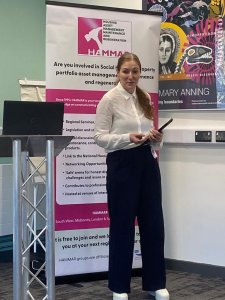Transforming Homes with Residents: Insights from the HAMMAR Southwest Meeting
Author: Dr Catherine Butler, Co-investigator, University of Exeter
The National Maintenance Housing Forum (NHMF) supports innovation, sharing of knowledge, and communication to deliver excellence in housing maintenance. As part of its ongoing work, it runs multiple events each year for those involved in social housing maintenance and asset management. I had the opportunity to speak on behalf of the Transforming Homes project at one of the recent forum events ‘Housing, Asset Management, Maintenance and Regeneration Southwest’ (HAMMAR). It was an excellent opportunity to learn more about this crucial area of work within the transformation of homes and highlight some of messages relating to resident engagement from the Transforming Homes project.
The day focused on a range of ongoing work from professionals involved in housing maintenance to engage residents and address challenges within the social housing sector, bringing particular focus on mould and damp in the context of Awaab’s law and its implications for the sector.
Awaab’s Law comes into effect in October 2025 and represents a response to crucial evidence on the role of poor housing conditions and the presence of mould and damp in the death of Awaab Ishak, a two-year old boy who tragically died due to prolonged exposure to damp and mould. The new law will require social landlords to investigate and fix dangerous damp and mould in set time periods as well as repair all emergency hazards within 24 hours.
The day began with a talk from Andrew Burke, Deputy Secretary of the National Housing Maintenance Forum, on upcoming changes anticipated for the sector, including the introduction of Awaab’s law and what this is likely to mean for social housing landlords and maintenance practice. This was followed by an incredibly powerful talk from Nadhia Kahn, Executive Director of Customer and Community from Rochdale Boroughwide Housing Limited (RBH) on the journey they have been on since Awaab’s death in the Borough to provide safe, warm and well-maintained homes. Nadhia gave a detailed account of the experience of Awaab’s traumatic death, bringing to light the real and horrific impacts of poor housing conditions for people living in them. She discussed the ongoing processes of change that have been implemented in the Borough since Awaab’s death and the remaining challenges, including issues of access for a small number of properties.
Isobel Ames from the Ministry for Housing, Communities, and Local Government followed Nadhia with a talk addressing the processes for consulting on and implementing Awaab’s law, including what it will mean for the sector. This was followed by a talk from Rosie Wills from Mid Devon Housing spoke about their experience of understanding and addressing issues with mould, damp and condensation using a combination of sustained resident engagement, monitoring, and technical modelling. She highlighted challenges providing solutions for these issues with multiple social issues intersecting with more technical or building fabric causes.
The morning concluded with a talk from Caritas Charles from the Tenant’s Participatory Advisory Service (Tpas), who provided insight into the work of the Service to support housing associations, local authorities, and residents groups and contractors to experience the benefits of tenant engagement.
The morning talks provided important context for the introduction of Awaab’s law, emphasising the crucial need to engage with residents and find ways to understand and resolve issues —often in challenging contexts.
In the afternoon, the discussion shifted to a broader set of issues related to housing maintenance. These included a talk from Will Collier from AICO Home life safety who spoke about the range of innovative products they offer for monitoring and addressing the performance of homes. It then came time for my talk which highlighted the consortium’s approach to engagement, from one-to-one resident conversations to collective events that bring residents from the same street or estate together to learn and discuss people’s experiences of living in their homes and how they could be transformed.

Credits: Julian Ransom
The day was rounded off by Jake Snell (Head of Asset Innovation, ABRI group), Trini Chakravarti (Director, the Better Building Alliance), and Tony Woods (Procurement Manager at PfH) who spoke about their experiences using Modern Methods of Construction (MMC) and linked challenges for the sector.
It was a great day for learning more about the crucial role of maintenance and asset managers in the development and delivery of home transformation within social housing, as well as key areas of innovation. The introduction of Awaab’s law will bring important changes to the sector —not least giving greater emphasis to the importance of resident engagement in housing maintenance and transformation processes.
